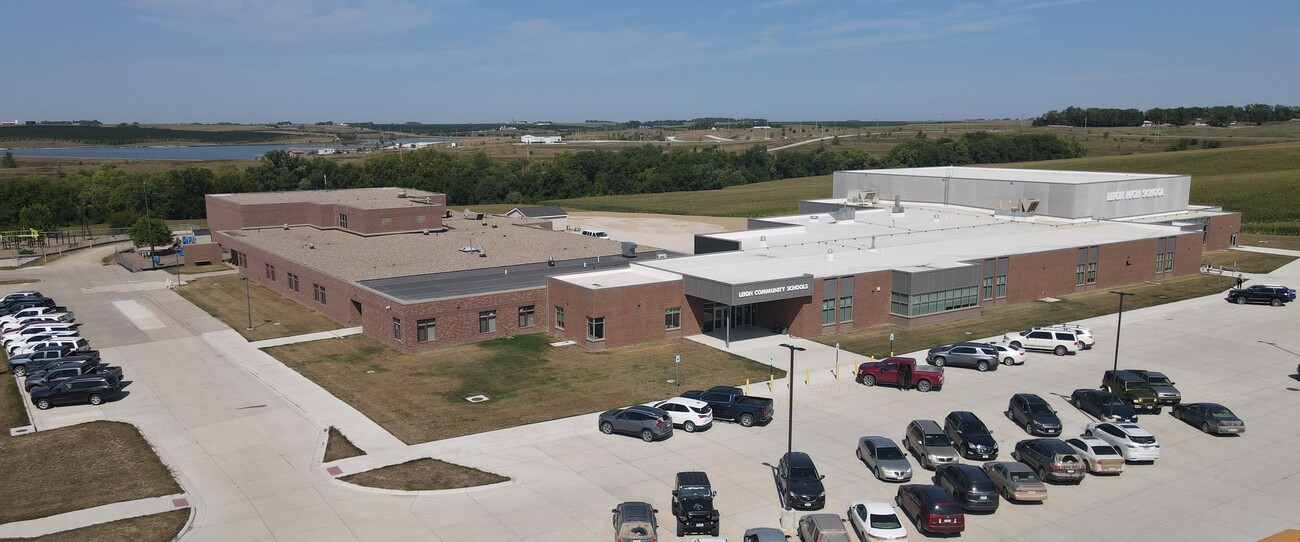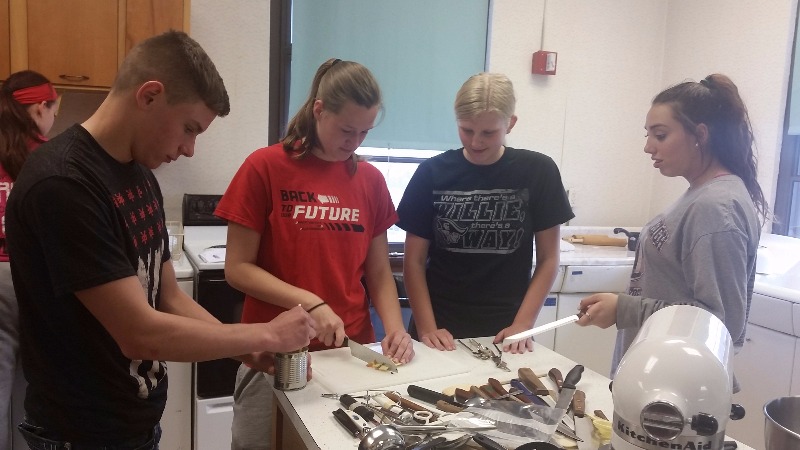How a School Co-op Can Be Successful: History of the Clarkson-Leigh Co-op
At a time where school consolidation seems like the only answer for population shifts between counties, rising education costs, and constantly changing economic and educational expectations, there is another solution that is often overlooked. High school cooperative sharing is another viable solution for schools being forced to eliminate school sports and activities due to dwindling numbers.
A multi-school co-op is often viewed in a negative light because it is wrongly associated with consolidation. The Clarkson-Leigh activity co-op is a successful example of how two schools of equal size can come together and resolve one of the biggest issues facing small schools today while still maintaining their own individual identities.
The formation of the Clarkson-Leigh Patriots began in a small way 5 years ago. The first year, the volleyball and track teams and junior high sports were the only activities to combine.
Since then, Leigh High School and Clarkson High School have joined forces to form Patriot football, boys’ and girls’ basketball, golf teams, and dance teams. Three years ago, Clarkson and Leigh also combined with Howells-Dodge to form the Highway 91 Cyclone softball team. The new sports addition this year is the Patriot wrestling team, marking the first time in decades either school has offered wrestling.
Leigh senior Daniel Arriaza said, “As a student athlete, I feel that the Clarkson Leigh co-op has benefited us in many ways. It made it possible for both towns to have enough players to compete in each sport. It helps improve our teams because have more players means more competition for varsity positions. This makes everyone work harder. The co-op has also afforded us many new opportunities that weren’t possible for past generations of students at either school. The co-op softball team and brand new Patriot wrestling team are great examples of this. Many Leigh students have become very close friends with Clarkson students through sports.”
The Clarkson-Leigh co-op has evolved to encompass more than just 7-12 sports over the years. We now have combined athletic booster clubs and thriving youth athletic programs. The FFA and FCCLA programs are both combined, and last year marked the first year that the band and choir programs teamed up.
But the connection goes further still. The two schools even share teachers for band, choir, art, ag, industrial tech, family and consumer science, Spanish, and college English. This is accomplished in a variety of ways depending on the situation. Some classes meet via distance learning TVs, some teachers travel back and forth between schools, and for other classes, students are bused back and forth throughout the school day.
No co-op is perfect, especially in the beginning. But every year we get a few more kinks worked out, and more processes become streamlined and routine. This does not happen magically. Administrations, faculty, parents, and staff at both schools have to work very hard at it, and it involves enormous amounts of communication, hard work, and compromise. But the sometimes painstaking process is worth it when students at both schools benefit from increased opportunities that otherwise would not be available to them.
According to NSAA’s website, there are 96 consolidated schools in Nebraska and only about 10-15 co-ops depending on the activity. Of these 10-15, Clarkson-Leigh is one of the few co-ops in the state between schools of equal size and power. Many of the rest are instances of a large school simply absorbing a much smaller school into their already existent programs without much changing for the larger school.
So if co-operative sports and activity sharing is working so well for Clarkson and Leigh, why aren’t more schools doing it?
For starters, many people do not understand that co-op does not mean consolidation. Nor does it mean that it will eventually lead to consolidation. With five years of a successful co-op program under our belt, there is no talk of consolidation between Leigh and Clarkson. In Leigh’s case, elementary enrollment is the highest it has been in 15-20 years. A pre-Kindergarten program was added this year, and plans are underway to build a three-room addition to the elementary building next year. Adding on a new high school to the existing elementary building is also a real possibility in the next couple years.
Another reason communities fight co-ops is because many community members are unwilling to look past deep-seated school rivalries and their own high school nostalgia for the benefit of a current generation of students.
In our case, before our co-op with Clarkson, Leigh High School students were suffering. Like many schools across the state, as our enrollment decreased, it become harder to even have enough kids to field teams. It may have presented an opportunity for students to have more playing time, but it limited their window of success because of a lack of competition. We were fortunate enough that both of our communities were able to look past rivalries and tradition to realize how beneficial a co-op would be to students.
An additional obstacle on the path to a co-op is the fact that all communities are afraid of losing a part of their identity. Small communities like Leigh and Clarkson take great pride in their schools. The school is the hub of all activity, and it is what residents feel makes their hometown special.
But our co-op has allowed both schools to maintain their identity without being forced into consolidation. We both operate completely separate elementary schools. Though much sharing exists between the two high schools, we are still two separate schools in two separate towns.
The only activities we do not co-op are speech team and the One-Act play. We are each supportive of each other in these areas, but it has been nice to retain these two activities on our own. The success of our One-Act team the past three years has been a source of school and community pride.
On the whole, I really feel that if more schools understood what it took to make a co-op successful, more schools across the state would co-op some activities. The school districts and communities of Clarkson and Leigh have developed a special bond over the past few years. The co-op has built relationships between not only students, but also administrations and faculties from both schools.
Clarkson Superintendent Rich Lemburg has been a part of the Clarkson-Leigh co-op from the start.
“I would say there have been three major reasons why the coop has been successful,” Lemburg said. “One is that there was a commitment from everyone involved, especially the coaches and the players right off the bat to make it work. I thought the coaches did a lot of good bonding exercises early to get kids from both schools to come together and get used to working together.
“Second, I think playing to both schools’ and facilities’ strengths have made a difference too, making sure the coop works for both schools and communities.
“Third, the continued work by the school districts to re-examine and analyze to see if there is anything that can be done to improve what we are doing for our students in the coop has played a huge role in our success.”
Not only has the relationship between students and faculty been solidified between both schools, but the communal support from both towns has initiated a positive reaction in both schools. Our close-knit communities are very involved in all school activities. The small town support has resonated throughout our schools by encouraging students to work their hardest and represent Leigh and Clarkson the best they can.
Leigh High School principal Troy Holmberg, in his first year with the district, said, “The co-op between Clarkson and Leigh is beneficial for our districts, truly the best of both worlds. With our combined student bodies we have consistent numbers for activities that otherwise may suffer or not exist. We can share staff to be coaches and sponsors. This allows them to offer their insight and experience to a greater number of students. The same is true with academic staff that we share.
“Through the co-op, we are able to maintain an identity that mirrors what is important in our community. As Leigh, we are a strong district in what we can do for our students. As Clarkson-Leigh, we become even stronger.”












